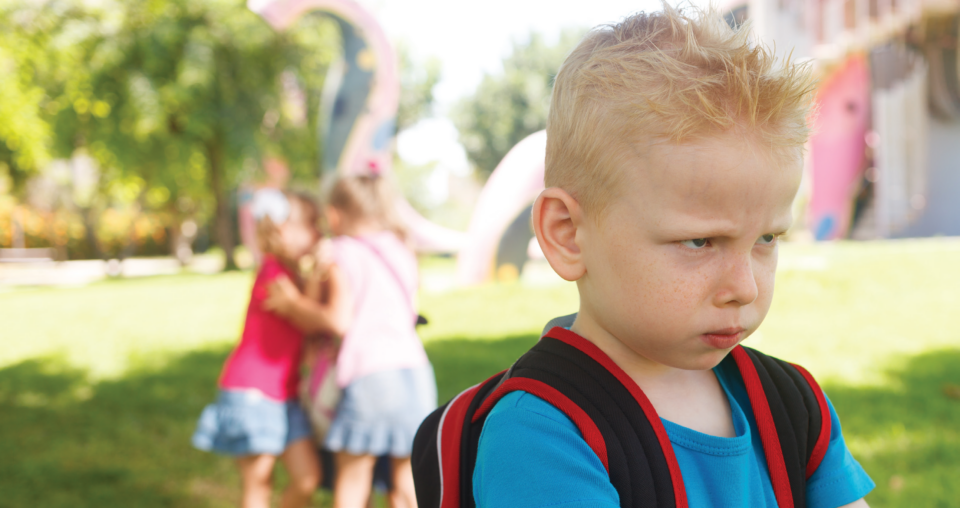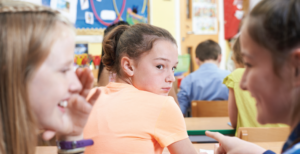If you notice your perky kid who once was excited to ride the school bus suddenly dreads the thought of going to school, they could be getting bullied. Bullying can affect even the happiest of kids, making a simple visit to the playground a living nightmare. In turn, their mental health can also be affected. Luckily, it’s never too late to help. Early intervention is the key to protecting your kids’ mental health, self-esteem and confidence when it comes to mean bullies at school.
So what is “bullying”? It is a very broad term, says Colleen A. Furey, Psy.D, a behavioral health consultant and licensed psychologist with Mercy Health Physicians.
“If I am working with a family where we have significant concerns, I ask them to use correct specific verbiage appropriate to the scenario,” she explains. “It’s OK to be specific if there are higher risks so that the school can understand the severity.”
The Definition of “Bullying”
It’s important that we distinguish the type of bullying that is going on. Bullying is defined as aggressive behavior that is intentional and involves an imbalance of power, says Furey. It’s repetitive and it can be physical, verbal or relational — it’s not just having conflict, and these days, a lot of bullying is happening online. Some kids bully by shunning others, spreading rumors and some turn to social media or electronic messaging to taunt others or hurt their feelings.
Furey says the bully, victims and bully victims (kids who bully others and deal with rejection from their friends) are all more likely to suffer from depression and anxiety. These can be either acute side effects or more long term depending on the severity and time of the bullying.
“Kids who are bullied tend to have a decline in their involvement in school — we can see grades drop, we certainly see more missed days,” she continues. “And with that we certainly see more health-related complaints — stomach aches, headaches — which can be a sign of anxiety or distress but can also be something they associate with being able to escape the school environment.”
If you notice behavioral changes in your kid such as not wanting to eat dinner with the family; not sleeping well; feeling more anxious; moody; not wanting to talk about their day and avoid certain situations — it may be time to step in.
Early Signs of Bullying
It’s sweet when little tots are playing nicely together, handing toys off back and forth. Then one kid refuses to share and here comes the pushing and biting. Surprisingly enough, that little tot is being a bully.
Bullying begins at a young age, around 3 and 4, when kids begin interacting with each other more. It is the early intervention that will keep the bullying from worsening, and luckily, bullying responds well to intervention, according to Furey.
“Kids most likely to start at that age, are more than likely seeing it in their own environment,” says Furey. “It does change over time, but it most certainly can start that young.”
It’s when there is an absence of help and intervention that it can grow into a bigger problem. Research shows that intervention at school doesn’t just change the kid, but the culture of school where they will see bullying decrease as well, says Furey. Luckily, many schools these days do offer effective school-based interventions to stop bullying right in its tracks.
Step in, Be Proactive
There is no clear research to support that bullying has worsened over the years, but we do know that schools are using curriculum that are helping numbers to go down, and with kids’ involvement online these days, there are increased opportunities for bullying (cyberbullying) which can get tricky.
“[Bullying becomes] a higher risk when parents are not monitoring the internet use of the kids,” says Furey.
It’s not always easy to distinguish between the bully, the victim and the bully victim, she continues, but there are ways we can step in and help in every case.
Countering Bullying
- Counter bullying with positive after-school social interactions (karate class, youth groups, etc.).
- Be sure your kid knows they can talk to you or a teacher or counselor.
- Talk to the school, make sure there is a plan and the bully is addressed.
- Ask that your kid has a buddy or system for when they go to the restroom, for example.
- Monitor kids’ digital activity; make sure they are not engaging in risky behavior and being victimized online.
- Teach kids to stand up for themselves; practice role playing at home that includes using words to stand up for themselves, ignoring smaller behaviors, practicing to say it outloud.
- Raise good bystanders. Socially skilled kids can use this to their advantage to help.
According to Furey, more progress is being seen when “good bystanders” step in; it doesn’t only apply to bullies and victims.






